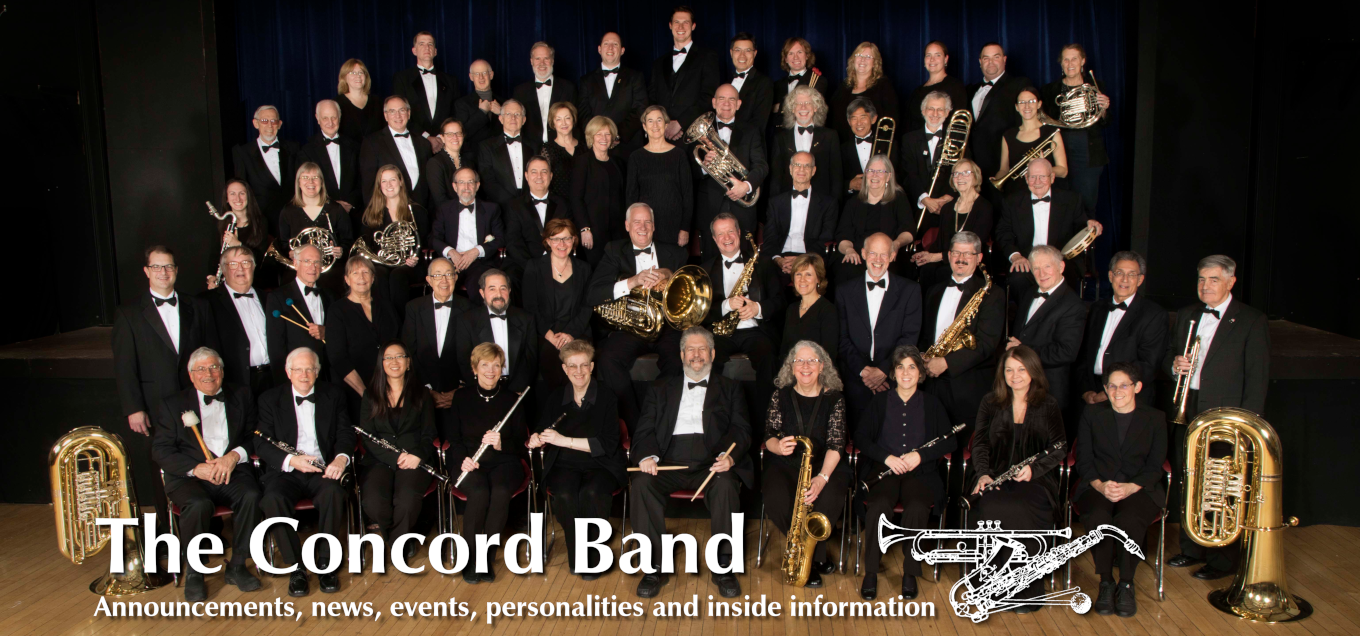Review of Concord Band concert Saturday October 28, 2006
By Pamela J. MarshallThe Concord Band delivered a splendid concert last Saturday, with fine playing of a program that shined a spotlight on guest composer and conductor Elliot Del Borgo.
Music Director William McManus opened the concert with "Majestic March" by Tchaikovsky in an arrangement for band that showed off the Concord Band's skill in the traditional march literature, although this was a new arrangement for band. The full sound, dominated by brass, gave way to a singing melody by the saxophones and clarinets in the middle section, with filigree from the upper winds. A hint of the Marseillaise melody made me wonder about this work's connection to Tchaikovsky's familiar 1812 Overture. Overall the Band delivered some very neat playing, with well-balanced percussion touches throughout.
Assistant conductor Paul Berler led the "Psalm for Band" by Vincent Persichetti, who was Mr. Del Borgo's teacher. The moving "Psalm" dates from 1952 and made beautiful use of the different instrumental colors available throughout the Band. The very exposed opening was a bit tentative with imperfect intonation, but as more instruments joined in, the problem disappeared and didn't return. The overlapping phrases of constantly changing instrumental colors culminated in some grand chords of brass answering winds. The tempo quickened for a final section that wove the ealier chorale melody into the texture.
For me, the high point of the program was "Of Sailors and Whales" by Francis McBeth, written for the California All-State Band in 1990. Bassoonist-turned-narrator Nathaniel Hefferman led off each of the five sections with a quote describing one of the characters of "Moby Dick." Mr. McBeth brought great imagination to this work, including having the musicians transform themselves into a choir for the third movement, accompanied only by low brass and a ship's bell. The Band's members demonstrated that they also sing quite well. There have been many musical treatments that evoke water and the ocean, and I felt that Mr. McBeth's was both original and rooted in the tradition of Wagner's Rheingold-long, low notes as the anchor, with phrases swelling upward and downward; first a single chord, like the opening of Rheingold, then expanding harmonically. The swirling sound of a long row of metal wind chimes added an extra shimmer. The final movement, titled "The White Whale," began with fanfare material and was a tour-de-force for the Band, which they handled masterfully, bringing to life the passions that inspired the music. The piece elicited bravos from the audience, deservedly so.
In the community spirit that I've come to expect at Concord Band concerts, the Band's president awarded a Lifetime Achievement Award posthumously to longtime member Jerry Welts. The trombone section, with help from the percussion, honored him with a toe-tapping rendition of Welts' arrangement of "Trombumba Bossa."
The second half of the program provided the audience with an overview of guest composer Elliot Del Borgo's band music. He often works with folk tunes, and Music Director Bill McManus and Assistant Conductor Paul Berler led two examples of these: "Slavonic Dances" and "New England Suite." These numbers were traditional-sounding band pieces with brass and woodwinds used in a solid-sounding but conventional way.
The setting of five tunes in "Slavonic Dances" caught my interest more than the "New England Suite." The saxophone section shined in the second tune, and the band was very comfortable with the uneven rhythms in two of the tunes, a signature feature of Eastern European melodies. The fourth lyrical tune had fresh, interesting harmonies, and the trumpets sparkled in the last tune in brief descending pyramids of notes. We also heard Mr. Del Borgo's beautiful arrangement of the "Intermezzo" from Mascagni's "Cavalleria Rusticana," with expressive woodwinds playing over a wash of gentle brass.
Bass clarinetist Elliot Finkelstein and his wife Bette commissioned the final work on the program. It was Mrs. Finkelstein's idea to commission a piece in honor of her husband's 70th birthday. The result, "Israeli Triptych" by Elliot Del Borgo was a lively and interesting setting of three familiar Israeli tunes: "Hanukah Song, " a richly harmonized "Hatikvah," and energetic "Hava Hagilah." The introduction was polished, almost a movie-style fanfare. The composer did a lively setting of "Hanukah Song" and developed it with canonic, overlapping entrances, bringing fresh interest. In "Hava Nagilah," the enthusiastic and accurate tamborine playing gave special color to the dance. I enjoyed the contrapuntal treatment of the melody and the uneven rhythms of the middle section. The melody returned in its original rhythms for a lively ending.
At the conclusion the composer made generous and well-earned compliments to the Band and presented a score to Mrs. Finkelstein. Mr. Del Borgo works with many young bands and he told me it was a treat for him to work with musically mature adults, who could respond quickly to musical suggestions. A band member commented to me that working with him was very rewarding because he communicated great musicality and invited them to stretch musically, to play each musical line expressively, and to stay focused and involved.
The Band played a less familiar Sousa march, "High School Cadets," as an encore. Afterward, long-time concertgoer Beth Diamond, daughter of percussionist Dan Diamond, declared that this was the Concord Band's best concert ever. She has attended since she was two years old, so she has a longer overview than I have, but I do agree that the Band's playing was superb in a program of interesting and challenging pieces, with the occasion made special by the newly commissioned work.
Pamela J. Marshall is a composer from Lexington and a horn player in the Concord Orchestra. Her music, along with online music reference material, is available from Spindrift Music Company (www.spindrift.com).





